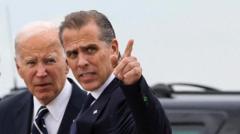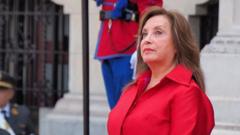David Weiss, the special prosecutor in the Hunter Biden case, has pushed back against President Biden's claims of unfairness, clarifying that his investigation was based on legitimate legal principles. The controversy surrounding Hunter’s gun and tax convictions has underscored heightened political tensions in the Biden administration.
Weiss Defends Hunter Biden Investigation Amid Pardon Controversy

Weiss Defends Hunter Biden Investigation Amid Pardon Controversy
Special prosecutor David Weiss rebukes President Biden’s claims during the Hunter Biden investigation, asserting impartiality in his findings.
The special prosecutor leading the investigation into Hunter Biden, son of President Joe Biden, has publicly criticized the president's remarks suggesting that the prosecution was politically motivated. David Weiss, in a recently released final report, refuted President Biden's "baseless accusations" and upheld that his inquiry was thorough and impartial, aimed solely at upholding the law amidst claims of political interference.
In the report, Weiss specifically defended his prosecution of Hunter Biden, who faced serious charges related to gun possession while under the influence of drugs and tax fraud. Hunter Biden's attorney labeled the investigation as a striking illustration of the misuse of prosecutorial power. In December, President Biden granted his son a full pardon, describing the judicial proceedings as a manifestation of political malfeasance and asserting that Hunter had been excessively targeted.
Weiss rejected these characterizations as "gratuitous and wrong." He emphasized that the legal actions taken against Hunter were justified due to his violations of the law. Hunter Biden had pled guilty to charges of tax evasion in September and had been convicted of gun-related offenses earlier. His father's pardon—contrary to previous statements about withholding clemency—effectively removed any further prosecutorial options for Weiss regarding actions taken against Hunter Biden during the specified period.
Weiss recognized the historical context of presidential pardons generating controversy, citing previous instances, such as those involving Bill Clinton and Donald Trump. However, he added that unlike previous pardons, this situation involved unsubstantiated attacks on the integrity of Justice Department officials.
As the investigation into Hunter Biden concluded, it revealed a plethora of personal challenges, including his struggle with addiction and other allegations that contribute to a complex family narrative. President Biden, who had largely remained silent during the proceedings, expressed a fierce defense of his son upon issuing the pardon, indicating that political attacks against Hunter aimed to undermine him as both a father and president.
The pardon was specifically backdated to cover a range of offenses for which Hunter had been charged, and Weiss noted that the unconditional nature of the pardon constricted his ability to pursue further legal consequences. Previously stating to the House Judiciary Committee that his work faced no political pressure from the justice department, Weiss’s investigation has drawn scrutiny from all sides of the political field—Democrats viewing it as politically charged while Republicans contended that justice systems showed leniency towards Hunter Biden.
After an earlier collapsed plea deal in 2023, which had been criticized by Republicans as overly lenient, Hunter's guilty pleas came as part of a larger saga fraught with political implications and family dynamics. Hunter Biden's attorney admonished Weiss for the missed plea agreement, citing political pressures as a factor for the sudden shift in prosecutorial strategy. This ongoing narrative reveals deeper tensions at play within the current political landscape, raising questions about the intersection of law, familial loyalty, and political rivalry.






















